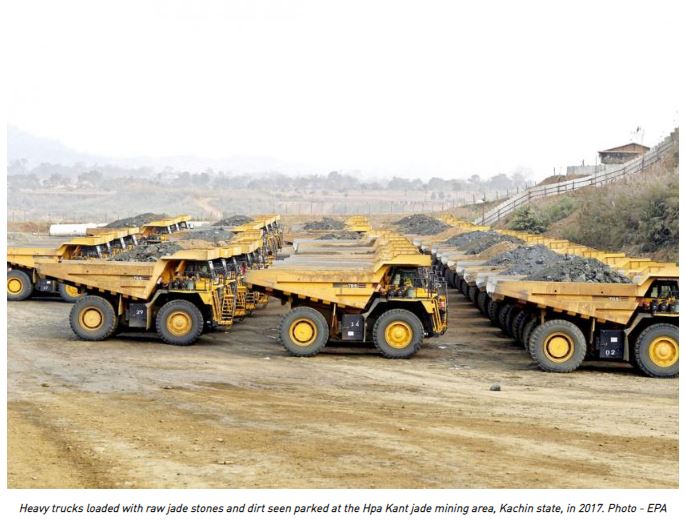Mining decentralisation in Myanmar requires better implementation to succeed
Recent reforms in Myanmar’s mining sector have given greater powers to states and regions. Following regulatory changes in 2018, the responsibility for issuing permits for artisanal and small-scale mines has shifted from Nay Pyi Taw to licensing boards overseen by state and regional governments. According to the mines law, artisanal mining refers to individuals working with ordinary hand tools and basic machinery, while small-scale refers to the operations of small companies with small machinery.
This move toward decentralisation has the potential to improve governance of a sector that has historically faced major environmental, social and governance challenges. Most artisanal and small-scale miners currently operate illegally without the necessary government permits. By reducing the physical distance that they must travel to get a permit, decentralisation could make it easier for local people to operate legally. One rationale for the recent reform is that legal title could strengthen livelihoods while helping government agencies to formalise and regulate mining activities.
Decentralisation in the mining sector is part of a broader shift in Myanmar. After decades of centralised and authoritarian rule, local stakeholders, especially in ethnic minority areas, are demanding a greater voice in political and economic decision-making. Nowhere is this more strongly felt than in the natural resource sector. Decentralisation could make government policy more sensitive to community needs and bolster peace-building efforts. However, the implementation of decentralisation has been incoherent. State and regional officials have new responsibilities but not necessarily the experience and skills to uphold them effectively. Legal requirements – for example the criteria on which to approve or reject permit applications – are vague and inconsistent. States and regions have received little guidance from the Union government. This means that the potential benefits of decentralisation could go unrealised.
So far, decentralisation has not made it any easier for miners to secure permits. Recent research by the Natural Resource Governance Institute (NRGI) found that application processes are slow, complex and expensive. According to one small-scale miner interviewed by NRGI, the review of an application involves more than 13 different steps at the state and region, township and potentially Union level. In Sagaing, the regional government received over 4000 applications between August 2018 and March 2019 but did not issue a single permit (though it has done so since). Many miners will continue to operate illegally rather than navigate this slow-moving bureaucracy.
Delays mean that application processes are more prone to corruption. Miners and civil society representatives in Sagaing told NRGI that miners need financial means and political connections to get a permit. In its current form, decentralisation will enrich local elites rather than improve the livelihoods of the impoverished miners that the government says it wants to help.
Decentralisation could exacerbate environmental impacts too. Myanmar’s environmental regulations are contradictory and unrealistic. Sources from government offices told NRGI researchers that environmental considerations are routinely ignored when reviewing permit applications. With each new permit representing a new source of revenue (and potentially bribes), states and regions might issue more permits than they can monitor. This could result in an increase in “legal” mines without adequate environmental safeguards.
Decentralisation also presents challenges for large-scale miners. The Union government retains responsibility for issuing medium- and large-scale permits. In the absence of effective coordination with states and regions this could lead to overlapping claims, and potentially tensions and conflicts with artisanal and small-scale operators.
Stakeholders at the Union and state or region level need to understand and properly manage these risks. Authorities must implement decentralisation in a manner that brings genuine benefits to local communities and miners. If successful, decentralisation could be a pre-cursor for Myanmar’s longer-term aspiration of further shifting power away from Nay Pyi Taw and establishing a federal system.
First, state and regional governments should make application processes more efficient and transparent. They should clearly define the criteria for issuing permits and reduce the number of institutions involved in decision-making. They should be transparent about how the application process works and who has received permits.
Second, the Union Ministry of Natural Resources and Environmental Conservation has a role to play in improving coordination and setting standards. Managing the mining sector is complex. The Union government should ensure a minimum level of harmonisation between states and regions and proactively manage the risk of overlaps between different permit types.
Finally, oversight actors must hold state and region governments accountable. Civil society organisations, parliamentarians and journalists must be able to spot inappropriate behaviour and call out officials who are not following the rules.
Decentralisation in mining presents a unique opportunity for Myanmar. Concerted action is needed to realize those benefits. Business as usual just won’t do.
Maw Htun Aung is NRGI’s Myanmar country manager. Sebastian Sahla is a consultant with NRGI. He was previously an associate in NRGI’s Yangon office.
Source: https://www.mmtimes.com/news/mining-decentralisation-myanmar-requires-better-implementation-succeed.html


 English
English




